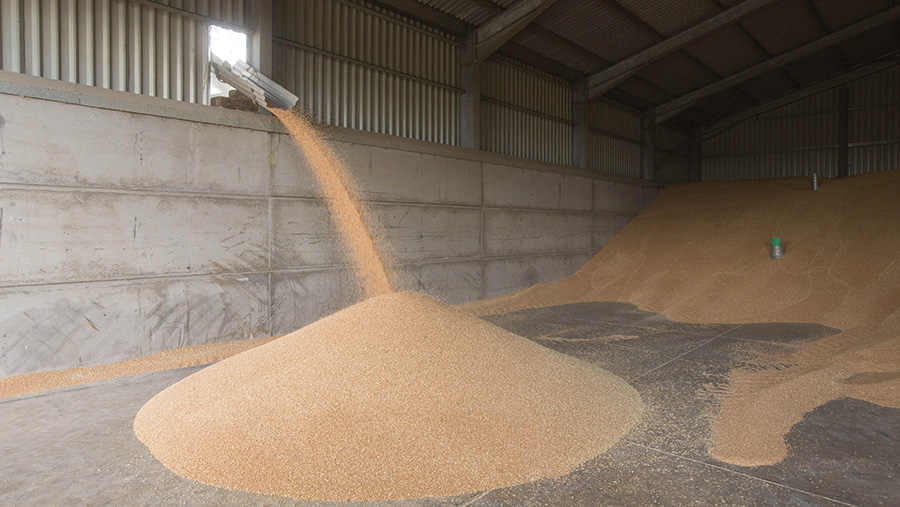Arable farmers asked to make decision on electronic grain passports
 © Tim Scrivener
© Tim Scrivener An industry-wide consultation has launched to see if there is support for moving from paper grain passports to an online-only system of electronic passports.
The results of an 18-month trial project have been published by AHDB, which is now calling for feedback from farmers and the rest of the grain trade.
The pilot project involved 199 live loads of milling wheat and milling barley which were delivered during 2014 and 2015.
See also: Incomplete passports cause delivery chaos
A cross-section of farmers and hauliers were asked to take part, working with merchants Fengrain, Gleadell, Glencore and Openfield and with Heygates and Muntons as the end-users.
Roz Reynolds, AHDB cereals and oilseeds head of marketing, said the e-passport pilot did show potential benefits for the industry as a whole and could lead to costs savings across the whole supply chain.
The potential savings to farmers have been estimated at just under £1/load.
But Ms Reynolds added: “It will be a collective industry decision, whether to adopt an electronic passport system or not, based on the findings from the pilot.”
NFU combinable crops board chairman Mike Hambly agreed the union had been encouraged by the results of the trial, but it was up to the industry to decide the next steps.
There were outstanding questions – primarily around the cost and ownership of the scheme – that needed answering, he said.
However, farmers involved in the trial had said the feedback of data was “extremely beneficial”.
“Real time feedback of data, both weights and analysis, of our product is critical in enabling us to better manage our businesses,” he said.
“This level of transparency is essential across this food industry. Just as livestock farmers utilise the data they receive from abattoirs, arable farmers need to be able to take the same approach with their product.”
According to the official report on the trial, two-thirds of the 22 farmers involved said they did not receive grain quality feedback from their merchant, yet receipt of such data provided an opportunity to react when supplying future loads.
For example, this could allow grain to be dried further helping to reduce rejections.
Another consistent opinion was that data was most valuable when supplied within hours of the load leaving the farm, although operational constraints during the trial occasionally led to the data being added several days later, by which time its value was limited.
Nearly two-thirds of the farmers and hauliers who took part said completing an e-passport took less time than the paper one and that the time taken fell the more they used the system.
There was also support for the development of an online system from the rest of the supply chain.
George Mason, senior executive at Heygates, said: “We can see only positives from the introduction of the new passport system: the ability for greater information transfer, real-time checking of the assurance status of the participants, an elimination of the time spent on query passports on the day of delivery and in the filing or archiving of accepted load paperwork.”
Glencore said it was supportive of e-passports project as it allowed live assurance checking and reduced delays due to errors on passports at intake.
Openfield added the current paper system was by no means “broken”, but it did have its shortcomings.
“A system that addresses these and enables the industry to effectively meet today’s requirements whilst giving us the ability to respond to changing future demands has to be a step forward.”
Fengrain said it too supported the development of an electronic system, but felt a further trial would be useful.
It had concerns that the trial had one farmer-initiated process for loads delivered into central stores and another processor-initiated process for loads going to a mill.
“This will be very confusing for a grower if having both types of deliveries taking place, especially at harvest.”
- Read the full report on the eGrain Passport Pilot Project (PDF). Farmers who are members of a trade organisation, such as the NFU, are asked to direct their views to their industry representative. However, those who are not can contact derek.carless@ahdb.org.uk
Potential benefits of e-passports
- No need for assurance stickers or passports pre-populated with assurance data (Scotland) thus eliminating associated problems such as stickers not arriving in time
- A platform facilitating feedback of grain quality data from processors. Data provided this way could help with management of grain supplies
- A number of identical passports can be completed quickly and efficiently ahead of collection, without having to write out the same information time and again
- Cost savings
Potential challenges of e-passports
- Trial participants identified that the system can be slow when not all participants fully understand it
- Some concern over ease of use for some other farmers
- Hauliers must keep phones charged as the idea is that they use a smartphone application to capture data at the point of loading.
- If no mobile data signal is available at the collection point, any data entered onto the smartphone is saved until data signal is available, but a mobile signal is needed at some point
- Some farmers do not have computers and they are needed to access the web portal

